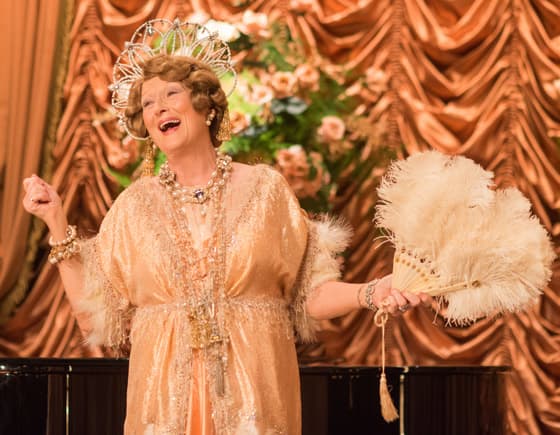Florence Foster Jenkins is a bit of fluff, but it's a sweet, charming bit of fluff, one that captures the magic of "little white lies" for the ones we love thanks to its three standout lead performances.
The titular character (a predictably wonderful and heartbreakingly earnest Meryl Streep) is a rich and eccentric heiress, the darling of the 1940s classical music scene thanks to her generous patronage and deep love of the arts. Florence's true passion is opera, and wants nothing more than to sing at Carnegie Hall. There's just one problem — Florence is a truly awful singer, but has absolutely no idea thanks to a flawless, well-meaning con her friends and devoted husband (Hugh Grant) have been executing for years.
The beauty of Florence Foster Jenkins is that, despite the absurdity of an extremely wealthy weirdo socialite with a horrible singing voice, the film never treats its heroine as a joke. Instead, it cheerfully celebrates the life of someone who sang her heart out, bursting with more enthusiasm than talent, and of the friends who loved her so much they went above and beyond to make her dreams a reality — no matter how unlikely.
It would have been easy to treat Florence like a punch line, and Frears does have a sly bit of fun poking at the illusions of the extremely wealthy, but Streep and the script paint her as a delightful woman full of true passion and with an indomitable spirit, despite her unorthodox marriage and myriad health issues.
Hugh Grant returns as the lovably roguish, befuddled Englishman character he excels at, but imbues his character with a deep, devoted, complicated love for his wife. The film's most surprising standout, though, is Simon Helberg as Florence's new pianist, Cosme McMoon, who is hired without realizing just what he's getting into. Soft-spoken, hesitant and terrified of tarnishing his reputation, Helberg is a delightful audience stand-in, his facial tics reflecting the perfect mix of our horror, amusement and disbelief every time his new patroness opens her mouth to sing. Like the film's audience, though, he can't help but adore Florence in the end.
(eOne)The titular character (a predictably wonderful and heartbreakingly earnest Meryl Streep) is a rich and eccentric heiress, the darling of the 1940s classical music scene thanks to her generous patronage and deep love of the arts. Florence's true passion is opera, and wants nothing more than to sing at Carnegie Hall. There's just one problem — Florence is a truly awful singer, but has absolutely no idea thanks to a flawless, well-meaning con her friends and devoted husband (Hugh Grant) have been executing for years.
The beauty of Florence Foster Jenkins is that, despite the absurdity of an extremely wealthy weirdo socialite with a horrible singing voice, the film never treats its heroine as a joke. Instead, it cheerfully celebrates the life of someone who sang her heart out, bursting with more enthusiasm than talent, and of the friends who loved her so much they went above and beyond to make her dreams a reality — no matter how unlikely.
It would have been easy to treat Florence like a punch line, and Frears does have a sly bit of fun poking at the illusions of the extremely wealthy, but Streep and the script paint her as a delightful woman full of true passion and with an indomitable spirit, despite her unorthodox marriage and myriad health issues.
Hugh Grant returns as the lovably roguish, befuddled Englishman character he excels at, but imbues his character with a deep, devoted, complicated love for his wife. The film's most surprising standout, though, is Simon Helberg as Florence's new pianist, Cosme McMoon, who is hired without realizing just what he's getting into. Soft-spoken, hesitant and terrified of tarnishing his reputation, Helberg is a delightful audience stand-in, his facial tics reflecting the perfect mix of our horror, amusement and disbelief every time his new patroness opens her mouth to sing. Like the film's audience, though, he can't help but adore Florence in the end.




